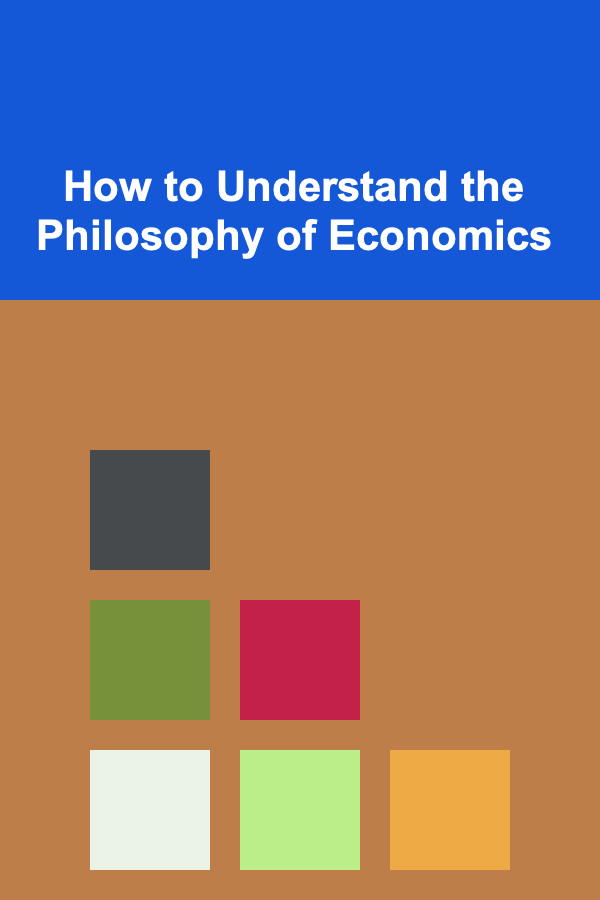
How to Understand the Philosophy of Economics
ebook include PDF & Audio bundle (Micro Guide)
$12.99$9.99
Limited Time Offer! Order within the next:

The philosophy of economics is a vast and intricate field that blends the empirical study of economic systems with deeper questions about human behavior, ethics, justice, and the nature of wealth. At its core, it is concerned with understanding the assumptions, foundations, and implications of economic theories and practices. If one seeks to grasp the philosophy of economics, it requires an exploration of various schools of thought, theoretical frameworks, and the ethical dimensions that underpin economic decision-making. This article offers a deep dive into the philosophical aspects of economics and how one can approach the subject for a fuller understanding.
What is the Philosophy of Economics?
The philosophy of economics is the branch of philosophy that investigates the conceptual foundations and methods of economics. It is distinct from economics itself in that it does not directly study economic data or phenomena but instead focuses on understanding the ideas, principles, and theories that underlie economic thinking. It delves into questions such as:
- What assumptions do economists make about human behavior?
- How do we understand economic systems like capitalism, socialism, or market economies from a philosophical perspective?
- What role do ethics and justice play in economic decisions?
- Can economics provide objective truths, or is it inherently subjective?
By addressing these fundamental questions, the philosophy of economics connects with disciplines like philosophy of science, ethics, political philosophy, and social theory. It serves as a bridge between the abstract, theoretical aspects of economics and its real-world applications.
The Role of Assumptions in Economic Theory
Economics is built on a series of assumptions that simplify the complexities of human behavior and societal interactions. One of the most debated aspects in the philosophy of economics is the nature and validity of these assumptions. For example, the assumption of rationality is a cornerstone of classical economics. This idea posits that individuals make decisions by weighing the costs and benefits in a manner that maximizes their personal utility.
However, the assumption of rationality has been challenged by behavioral economics, which argues that humans are not always rational. Psychological and cognitive biases often influence decision-making, leading individuals to make choices that do not maximize their utility. This challenge has raised important philosophical questions about the nature of human agency, free will, and the accuracy of economic models.
The debate over assumptions is not limited to rationality. Economists also make assumptions about competition, market efficiency, the nature of property rights, and the distribution of wealth. Philosophers often question the ethical implications of these assumptions. For instance, is it just for a society to rely on market mechanisms that can lead to inequality? Does the assumption of competition ignore the potential for monopolies or exploitation?
Ethical Dimensions in Economic Thought
A central concern in the philosophy of economics is the relationship between ethics and economic systems. Economic decisions, whether made by governments, corporations, or individuals, often have profound ethical implications. Philosophers have long debated whether economic systems should prioritize efficiency, equality, freedom, or some combination of these values.
In classical economic thought, as exemplified by Adam Smith's The Wealth of Nations, the pursuit of self-interest in competitive markets is thought to lead to the greatest good for society. The so-called "invisible hand" of the market supposedly allocates resources efficiently and maximizes welfare. However, this view has been heavily criticized, particularly by those who argue that market outcomes can lead to inequality, exploitation, and environmental degradation. Critics of laissez-faire economics, such as John Maynard Keynes, argue that economic systems need to be regulated and that markets do not always lead to the most just or efficient outcomes.
The philosophical question of justice in economics is closely tied to the work of John Rawls, whose Theory of Justice offers a framework for understanding the fair distribution of resources in society. Rawls suggests that a just economic system is one that guarantees the greatest benefit to the least advantaged members of society, a principle known as the "difference principle." This idea stands in contrast to the libertarian view, which prioritizes individual freedom and minimal government interference.
At the intersection of ethics and economics, questions arise about wealth distribution, poverty, and social mobility. Should individuals have the right to accumulate vast amounts of wealth, or should society take measures to ensure a more equitable distribution of resources? These questions do not have simple answers, and the philosophy of economics provides the tools to critically examine these issues.
The Philosophical Foundations of Economic Systems
Various economic systems---capitalism, socialism, and communism---are rooted in different philosophical assumptions and principles. Understanding these systems requires exploring their respective philosophical foundations.
Capitalism and Individualism
Capitalism, the dominant economic system in much of the world, is rooted in individualism and the belief in the primacy of private property. Philosophers like John Locke and Ayn Rand have been influential in shaping the theoretical basis of capitalism. Locke argued that property rights are a natural extension of individual liberty, while Rand's objectivism promotes self-interest as the highest moral purpose.
Capitalism is built on the idea that individuals should be free to pursue their own interests, with minimal interference from the state. Markets are seen as the most efficient way to allocate resources, with competition driving innovation and wealth creation. However, capitalism has been critiqued for its tendency to produce inequality and concentrate wealth in the hands of a few. Marxist critiques, for instance, argue that capitalism leads to the exploitation of workers and the alienation of individuals from their labor.
Socialism and Collective Good
In contrast to capitalism, socialism emphasizes collective ownership and the redistribution of wealth. Philosophers like Karl Marx and Friedrich Engels argued that capitalism inherently exploits workers and creates unjust inequalities. Marx's theory of historical materialism posits that economic systems are shaped by material conditions and class struggle, and that capitalism will eventually give way to socialism as the working class rises up against the bourgeoisie.
Socialist economic thought emphasizes the idea of a fair distribution of resources and the importance of meeting everyone's basic needs. However, socialism has also faced criticisms, particularly concerning the potential for inefficiency and authoritarianism in state-run economies. Philosophers like Friedrich Hayek and Milton Friedman have argued that central planning stifles individual freedom and leads to economic stagnation.
Communism and the End of Class Struggles
Communism, as articulated by Marx, represents the final stage of human economic development, where class distinctions are abolished, and wealth is distributed according to need. In a communist society, private property would be abolished, and the means of production would be collectively owned. The goal of communism is to create a classless, stateless society where everyone has equal access to resources and opportunities.
While communism has been praised for its vision of equality and social justice, its practical implementation has often led to totalitarian regimes, as seen in the Soviet Union and Maoist China. Philosophers have debated whether communism, in its ideal form, is achievable or desirable. Some argue that the idea of a stateless, classless society is utopian, while others believe that the pursuit of such a society is worth striving for, despite the challenges.
The Role of Economics in Society
The philosophy of economics is also concerned with the role that economics plays in society and how it interacts with other spheres of human life, such as politics, culture, and the environment.
Economics and Politics
Economics and politics are deeply intertwined. Political philosophers like Thomas Hobbes, John Locke, and Jean-Jacques Rousseau have discussed the relationship between individuals and the state, and these discussions are relevant to contemporary debates about economic systems. For instance, the debate between free-market capitalism and government intervention is essentially a political question about the appropriate role of the state in regulating the economy.
Some political philosophers argue that the state has a responsibility to ensure social welfare and correct market failures. Others, like libertarians, believe that the state should play a minimal role and that markets should be left to operate freely. These political philosophies have real-world implications for economic policy, including debates over taxation, social safety nets, healthcare, and education.
Economics and the Environment
Another important area of philosophical inquiry in economics is the relationship between economic activity and the environment. Economic systems are often seen as inherently exploitative of natural resources, and environmentalists have criticized capitalism for its focus on profit maximization at the expense of sustainability. Philosophers like Aldo Leopold and Arne Naess have argued that a more ecologically sustainable economic system is necessary to protect the planet for future generations.
The philosophy of economics also raises questions about the ethical implications of economic growth. Is endless economic growth sustainable, or should societies shift toward a model of steady-state economics that prioritizes environmental preservation and social well-being over material wealth?
Conclusion
Understanding the philosophy of economics requires not only an examination of economic theories and systems but also a deep engagement with the ethical, political, and environmental questions that shape economic life. It challenges us to reflect on the assumptions that underpin economic models and to question the fairness, justice, and sustainability of economic policies. By exploring the philosophical dimensions of economics, we gain a richer understanding of the forces that shape our world and the principles that guide our collective decision-making. Whether one is a student of economics, a policymaker, or simply an engaged citizen, a thoughtful approach to the philosophy of economics can help us navigate the complexities of modern economic life.

How to Design Small Bedrooms That Feel Bigger
Read More
How to Refresh Your Living Room with DIY Projects
Read More
Making Money through Deep Learning: A Step-by-Step Guide
Read More
How To Study Marine Ecosystem Services
Read More
How to Validate Your Startup Idea Before Investing
Read More
How to Identify Fake Crystals: A Buyer's Guide
Read MoreOther Products

How to Design Small Bedrooms That Feel Bigger
Read More
How to Refresh Your Living Room with DIY Projects
Read More
Making Money through Deep Learning: A Step-by-Step Guide
Read More
How To Study Marine Ecosystem Services
Read More
How to Validate Your Startup Idea Before Investing
Read More